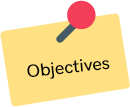Objectives
1. Understand basic concepts of fine motor development and how it relates to handwriting.
2. Understand basic strategies to support children experiencing challenges with fine motor activities.
3. Recognize ‘Red Flags’ for written output challenges and have the necessary resources to address these challenges.
4. Adapt and modify everyday objects to help support a child’s learning based on foundational needs.

 Fine Motor
Fine Motor
 Gross Motor
Gross Motor Sensory
Sensory